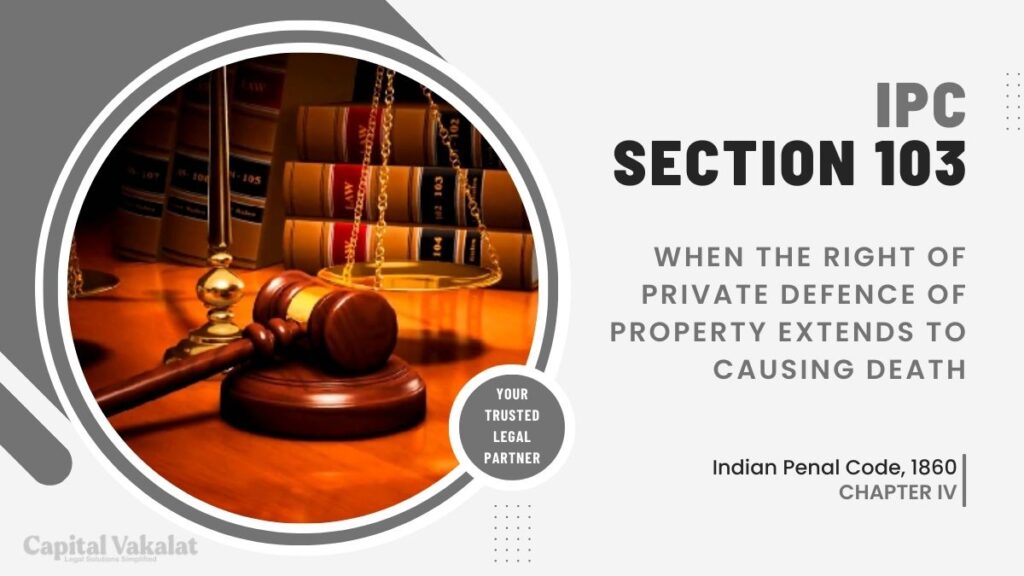In the realm of legal jurisprudence, the Indian Penal Code (IPC) stands as the bedrock that defines and governs various criminal offenses. One of the critical aspects it covers is the right of private defence, a fundamental principle that allows individuals to protect their lives and properties. Section 103 of the IPC deals specifically with the circumstances under which the right of private defence of property extends to causing death.

This article delves into the intricacies of Section 103 IPC, shedding light on the conditions and limitations that govern this critical legal provision.
Understanding Section 103 IPC
What is Section 103 IPC?
Section 103 of the Indian Penal Code is a legal provision that outlines the circumstances in which an individual can use force, including deadly force, to protect their property. It acts as a safeguard for property owners, allowing them to defend their possessions against unlawful encroachments.
When Can the Right of Private Defence Extend to Causing Death?
Immediate Threat to Property
Under Section 103 IPC, the right of private defence extends to causing death when there is an immediate and imminent threat to the property. This means that if an individual reasonably believes that their property faces an immediate danger, they can take actions, including using lethal force, to defend it.
Reasonable Apprehension
The use of deadly force must be based on reasonable apprehension. In other words, the property owner should genuinely fear that the threat to their property will result in substantial harm or destruction if not met with appropriate resistance.
Limitations on the Use of Deadly Force
Proportionality
Section 103 IPC emphasizes that the use of deadly force should be proportional to the threat faced by the property. Excessive force that goes beyond what is necessary to protect the property may not be justified under this provision.
No Excessive Harm
The right of private defence does not extend to causing more harm than is necessary to repel the threat. If the property owner uses force that results in death, it must be demonstrated that such force was the only means available to prevent the harm.
Legal Precedents
Several legal precedents and court decisions have clarified the application of Section 103 IPC. Courts have consistently upheld the right of private defence of property but have also stressed the importance of ensuring that the force used is reasonable and proportionate.
Conclusion
Section 103 IPC plays a pivotal role in safeguarding the rights of property owners in India. It grants them the authority to protect their property from immediate and imminent threats, even if it involves using lethal force. However, it is essential to exercise this right judiciously, ensuring that the force used is both necessary and proportional to the threat.
In conclusion, Section 103 IPC serves as a vital legal provision that empowers property owners to protect their assets when faced with immediate and imminent threats. However, it is crucial to exercise this right judiciously, keeping in mind the principles of proportionality and reasonableness. By understanding the nuances of Section 103 IPC, individuals can navigate the complex landscape of property rights and self-defense within the bounds of the law.
FAQs
What happens if I use excessive force to defend my property under Section 103 IPC?
Using excessive force that goes beyond what is necessary to protect your property may lead to legal consequences. It is essential to ensure that the force used is proportionate to the threat.
Are there any legal precedents that clarify the application of Section 103 IPC?
Yes, there have been several court decisions that provide clarity on how Section 103 IPC is applied. Courts have consistently upheld the right of private defence but have also stressed the importance of using force judiciously.
Can I use lethal force to protect my property against non-immediate threats?
No, Section 103 IPC specifically pertains to immediate and imminent threats to property. It does not extend to situations where the threat is not immediate.
Is it advisable to seek legal counsel if I have to use deadly force to protect my property?
Yes, it is advisable to consult with legal experts if you find yourself in a situation where you need to use deadly force to protect your property. They can provide guidance on how to ensure that your actions are within the boundaries of the law.